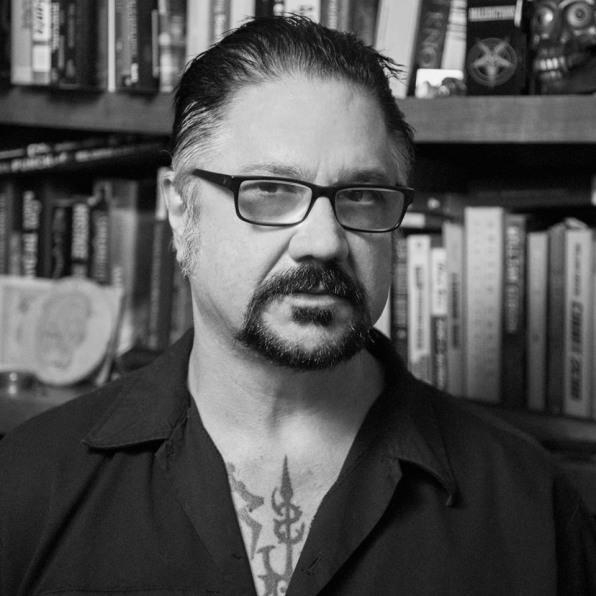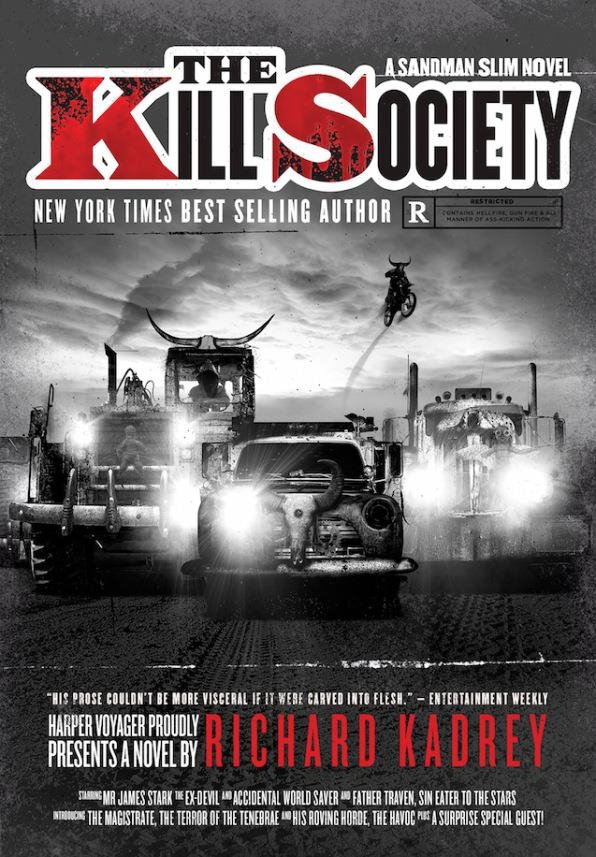There’s no one way to write a novel. There are, however, a million ways to screw up a book—or worse, start one and never finish it. If you’re looking for tips on how to keep the scribbling of your first tome on course, we’re betting that having the advice of a successful author might be a smart place to start.
The son of a journalist, New York Times best-selling author Richard Kadrey has been around writers and has worked professionally as one himself for most of his life. He’s a low-drag, high-output book-writing machine: The 16 novels he’s published include Metrophage, his celebrated Sandman Slim series (whose latest installment, The Kill Society, was released this month), and most recently, The Wrong Dead Guy. If you’re a fan of dark urban fantasy, gritty crime stories, or heist capers, Kadrey’s your guy.

Kadrey took a break from planning his next Sandman Slim book to talk to Fast Company about his methods, his inspiration, and the tools he uses as part of his craft—particulars that might just give you an edge the next time you’re looking to churn out some pages.
Learn The Craft
No one is born a great writer. It’s a skill that is honed through constant practice. By writing at every opportunity that presents itself, even the lousiest authors can sharpen their skill until their prose becomes serviceable, or if they’re lucky, a pleasurable read.
You’ll want to read as much and as often as you can, too. After all, how will you know if your work’s worth the paper it’s printed on if you don’t take the time to compare it to what other authors have produced? In some cases, the books you read may also be instructive. A lot of writers have spent a lot of time writing about what works for them—and their methods could potentially work for you too.
“Certainly for fiction writing,” Kadrey says, “one of my favorites to recommend is Stephen King’s On Writing. He’s not someone who’s going to take you somewhere weird and complicated. He explains how he does it and why it works for him.” Kadrey also suggests writers check out Elmore Leonard’s 10 Rules of Writing (of which Kadrey agrees with about 85%), The Successful Novelist by David Morrell, and Story by Robert McKee. You might be in harmony with everything you read, and that’s okay. Identify what applies to you in each book and take those lessons to heart. Kick the rest to the curb.
“You’re not going to read a book on writing and find out how to write,” Kadrey says. “But a good book on writing will provide you with a few things that are applicable to you. You’re going to have these little moments reading where a lightbulb goes on over your head.”
Research & Prepare
Just as no one book can teach you how to write, there’s no single way to prepare for or research your first novel. For Kadrey, planning a new writing project has always been a chaotic process. So he does what he can to keep things simple every step of the way.
“It’s a very scattershot process,” he says. “I’ll have a very specific idea—perhaps a plot idea or even just a set of images. And I just start making lists of images, of plot points. I’m a big believer in the unconscious. All these ridiculous notes and pictures that I put together will often make sense in some way I can’t perceive at first. So I just throw everything in a notebook. Eventually, you start seeing connections. They start spreading out like spider webs. And then you have the beginning of a book.” These lists, along with any images that speak to him, are compiled into a Moleskine Cahier Journal, which Kadrey likes because he can fold back the pages and hold the notebook like a comic book or magazine.
Where Hemingway suggested sweating blood on to a page in order to write, Kadrey prefers ink. While not married to a particular brand of writing implement, he favors Tul retractable gel pens, Pilot Varsity fountain pens (though they do tend to bleed through the paper in a Moleskine, so maybe consider a different notebook), and Maxmadco’s pricey but beautiful bolt-action pen.
While much of Kadrey’s creative process occurs on paper, he also relies on Scrivener. An inexpensive but powerful research and writing application for Windows PCs, Apple computers, and soon, iOS devices, Scrivener helps Kadrey collect his thoughts and research into something that, should he bang his head against his desk enough times, will eventually be transformed into a book.
Find The Right Writing Tools
Sorting out your research, plot, and character notes are only minor victories in a much larger war. Sooner or later, you’ll come to a point where there’s nothing left to do but start writing.
While Scrivener comes packed with features that can be used through every step of the writing process, right up to formatting your draft into a manuscript that’s ready for submission, Kadrey only uses it to organize his thoughts. For pounding out his books, he turns to Microsoft Word.
When his hands aren’t busy keyboarding his books into his 13? MacBook Air or 12.9? iPad Pro and Logitech Create Backlit Keyboard Case with Smart Connector, Kadrey also relies on the voice recognition program Dragon for Mac (or Dragon Naturally Speaking for PC users). Using Dragon helps alleviate some of the pain in Kadrey’s wrists—the result of years of typing. But it provides the added bonus of tweaking his brain to work in ways that writing on paper or typing can’t provide.
“It’s a nice thing to be able to use voice recognition,” says Kadrey. “You end up thinking about things in a different way. It can speed things up. Even after all these years, I’m a terrible typist. Dragon won’t make spelling errors. It will make dumb word substitutions, but those are easy to find. You have to work with it, you have to teach it, but it’s worth the effort.”
Stay Active & Proactive
Completing any piece of writing, as a professional or an amateur, is a major victory. It means you’ve given form to the stuff of your imagination so that others can share in it. So be sure to celebrate your accomplishment!
If you choose to submit your work for publication to a website, magazine, or publishing house, Kadrey suggests that should your story be turned down, you not take rejection personally.

“If it feels hard to get into the business right now, it’s because it is,” he says. “Especially fiction—and I’m sorry to tell you that. There’s so much competition. The advice is the old stuff: You have to finish what you start and you have to keep sending it out. When you’ve written a story or even an article if you’re into journalism, send it out. While you’re waiting for a reply, don’t just sit there, start the next piece. Try and get as much work out in circulation as possible. There’s no magic way to get any of this going.”
While there might not be a foolproof trick to becoming a professional author, Kadrey believes there is a surefire way to defeat writer’s block and the frustration that comes with rejection: Never fear changing up your routine.
“If you get stuck—and this really works for me—change your method,” Kadrey says. “If you’re composing on a keyboard and get stuck, get a pen and paper. If you’re working with pen and paper or computer in the office, get your iPad and move around. Go sit in the living room or in a cafe. Break up your system. Break up your habits. People make fun of people writing in cafés. But that could be the perfect thing to do sometimes, just to get out of your environment or use a different machine sometimes. Change something.”
And above all else, if you have a story to tell, never stop writing.
There’s no magic formula to becoming a successful writer, but novelist Richard Kadrey offers some go-to tips for starting—or finishing—your first novel.
There’s no one way to write a novel. There are, however, a million ways to screw up a book—or worse, start one and never finish it. If you’re looking for tips on how to keep the scribbling of your first tome on course, we’re betting that having the advice of a successful author might be a smart place to start.
Fast Company , Read Full Story
(39)